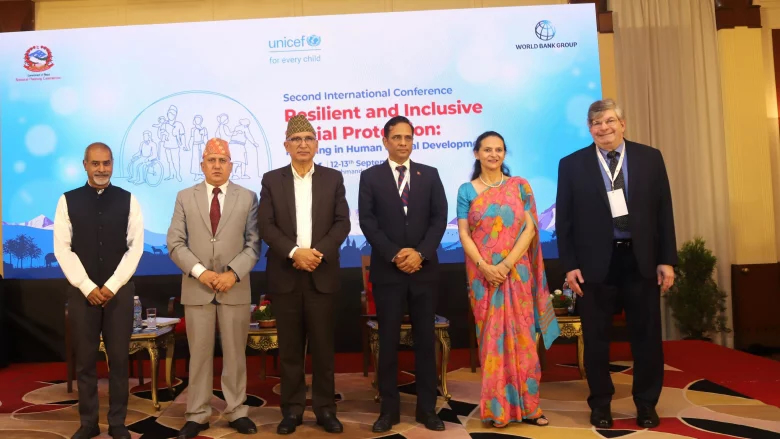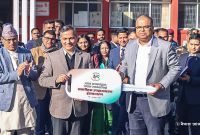Nepal Hosts Major Conference on Social Protection: Can New Investments Break the Poverty Cycle?

The Government of Nepal's National Planning Commission, in collaboration with UNICEF and the World Bank, is hosting the second international conference on social protection in Kathmandu over the next two days.
The conference, titled “Resilient and Inclusive Social Protection: Investing in Human Capital Development,” was inaugurated by the Honorable Deputy Prime Minister and Finance Minister, Mr. Bishnu Paudel. Its aim is to encourage important discussions on how social protection systems can help reduce poverty, strengthen resilience, and support the human capital development of future generations.
At the inauguration, Minister Paudel emphasized Nepal’s commitment to investing in its human capital. "This conference is timely as Nepal focuses on inclusive social protection to meet the needs of all, particularly children and future generations," he remarked.
Nepal is witnessing rapid changes in its economy, society, and demographics, with around 20% of its population still living below the poverty line, and inequality remains a significant issue. While the country's constitution guarantees social security rights for vulnerable groups, the current social protection system has largely concentrated on the elderly, leaving children and other vulnerable populations with limited support.
Prof. Dr. Shivaraj Adhikari, Vice Chairperson of the National Planning Commission, noted that the Sixteenth Plan prioritizes human capital development, especially through increased investment in children. He highlighted that human capital development is crucial both as a goal and a tool for the nation's growth and emphasized the essential role social protection plays in achieving this.
Despite the government's growing investments in social protection, the impact on poverty reduction, human capital development, and resilience building has been limited. More efforts are needed to address risks throughout the human life cycle.
UNICEF South Asia’s Regional Director, Mr. Sanjay Wijesekera, underscored the importance of investing in early childhood, particularly through initiatives like universal child grants, to break the cycle of intergenerational poverty. “This conference reaffirms our dedication to the children and youth of Nepal, while also pushing us to create a world where every child, regardless of their circumstances, can thrive,” he said.
The conference continues the discussions from the 2019 International Conference on Social Protection, which emphasized strengthening social protection for children, expanding child grants, establishing an integrated registry, adopting the cash-plus approach, and boosting investments in productive employment and social security for both formal and informal sectors.
This year’s event offers a platform to assess Nepal’s progress since 2019, exchange knowledge, learn from best practices, and collaborate on achieving SDG Target 1.3, which focuses on implementing nationally appropriate social protection systems for all.
Ms. Preeti Arora, World Bank Operations Manager for Maldives, Nepal, and Sri Lanka, highlighted the importance of adaptive social protection systems in the face of economic challenges, global conflicts, and climate change. "Effective social protection can shield vulnerable groups, including women, youth, and children, from crises, while empowering them to invest in education, healthcare, and other critical services," she noted.
The conference brings together high-level representatives from the Government of Nepal, UNICEF, the World Bank, international social protection experts, and key stakeholders from various sectors.
The keynote address, delivered by Dr. Michael Samson, Director of the Economic Policy Research Institute, focused on the global perspective of investing in social protection to enhance human capital, inclusion, and resilience.




![From Kathmandu to the World: How Excel Students Are Winning Big [Admission Open]](https://nepalaaja.com/img/70194/medium/excel-college-info-eng-nep-2342.jpg)
